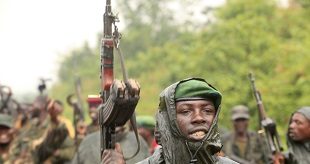
Lagos, Nigeria | AFP | Rights groups have gone on the offensive over the deployment of the military in Nigerian elections as a new polling day looms.
With elections due on Saturday for governors in 29 states and local assemblies, campaigners say the military cast a dark shadow over last month’s vote for the presidency and legislature.
Two lobby groups, the Save Democracy Women (SDW) and Impact Future Nigeria (IFN), staged a peaceful protest in Abuja on Wednesday over what they called “the militarisation of the 2019 general elections”.
IFN convener May Uneku blamed last month’s low voter turnout — just 35 percent — on the heavy presence of troops in the streets.
“We condemn in totality the involvement of the military in our elections,” she was quoted as saying in local media on Thursday.
“During the just-concluded polls, people were killed. The elections were a total charade because there are video and pictorial evidence of people screaming for their lives, military men were harassing and shooting people.”
The February 23 vote, which also chose legislators for the National Assembly, was marred by violence that claimed at least 53 lives and many more wounded.
Civil society monitors said they also recorded instances of soldiers blocking voters from getting to polling stations in the south.
The main opposition Peoples Democratic Party (PDP), whose beaten presidential candidate, Atiku Abubakar, is challenging the result, has also questioned the use of troops.
The army has no official role in providing election security but can provide armed back-up to the police if required.
– ‘Ruthless’ –
In the runup to the vote, President Muhammadu Buhari ordered soldiers to be “ruthless” with ballot box snatchers.
The 76-year-old former military ruler warned anyone who tried to disturb voting risked his life.
That ruffled feathers in the opposition camp, sparking accusations that it was a “licence to kill” and calls for the order to be withdrawn.
But army chief Lieutenant-General Tukur Buratai said his men would obey their commander-in-chief.
The PDP cautioned Buratai against dragging the military into politics — a sensitive issue in Nigeria where there have been six successful military coups since independence in 1960.
It described Buhari’s order as “an aberration of Nigerian laws and a recipe for crisis”.
Buhari insisted his directive was meant only for trouble makers and election riggers. Buratai has again repeated the military is “apolitical”.
In southern Rivers and Bayelsa states in the heart of the oil-rich but volatile Niger delta, an army officer and three soldiers were killed, sparking fear of reprisals among the people.
In one instance, Rivers governor Nyesom Wike accused the military of complicity in the killing of 16 people in Abonnema while dozens have been arrested.
He said soldiers had laid a siege on the riverine town, forcing thousands to flee to Port Harcourt, the state capital.
– Tensions –
Tensions are running high in Rivers, which has a history of political violence, after the Supreme Court ruled that candidates from Buhari’s All Progressives Congress could not run because of procedural irregularities.
There have been a rash of similar court cases elsewhere, notably in Kano in the northwest, while ethnic tensions are adding to fears about the outcome of a close race in the commercial capital, Lagos, in the southwest.
Analysts and activists though still question the rationale for deploying troops for purely civil matters.
Security consultant Don Okereke told AFP the deployment of soldiers was “an aberration”.
“We have seen a situation where soldiers have been accused of extra-judicial killings. In Rivers, Bayelsa and Akwa Ibom states, many people were killed on election day in skirmishes with soldiers,” he said.
The military’s role was to protect the sovereighty of the country against external aggresssion.
“We are not in a war situation. So why deploy soldiers for election matters? This is the job of the police and other para-military outfits,” he said.
Okereke said the courts have also previously ruled against the deployment of soldiers for elections.
Buhari has already been accused of acting beyond his remit, stoking fears of authoritarianism, by suspending the chief justice, who is charged with corruption.
The potential use of soldiers against the opposition would not help the situation, he added — “Such a practice is not good for our democracy. It should be discouraged.”
Some commentators have also suggested that low turnout on February 23 may have been caused by voter disinterest.
The election was initially scheduled to be held on February 16. But Nigeria’s electoral body ordered a week-long postponement for technical reasons, just hours before ballots were due to be cast — a move that caused widespread anger and dismay.
 The Independent Uganda: You get the Truth we Pay the Price
The Independent Uganda: You get the Truth we Pay the Price


